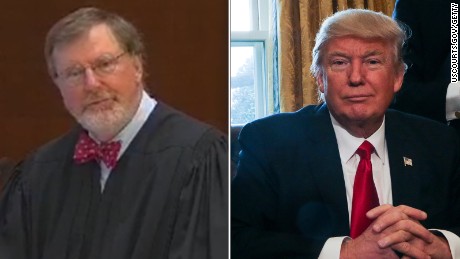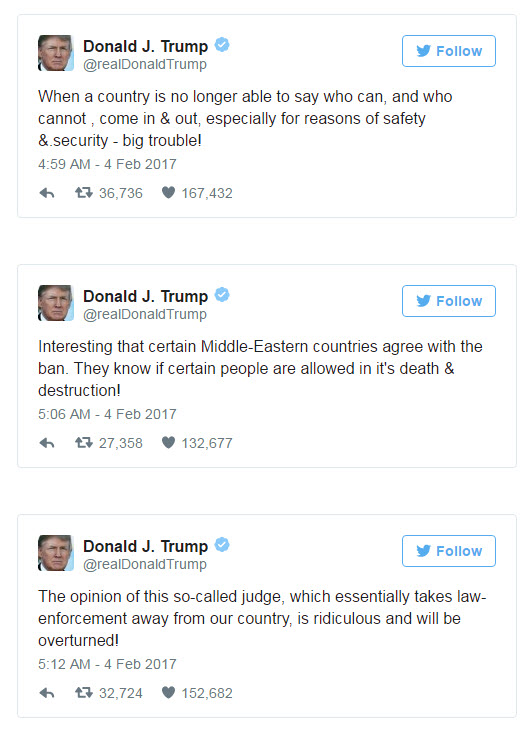
James Robart, the U.S. district judge in Washington State, offered little explanation for his decision to stop President Trump's executive order temporarily suspending non-American entry from seven terror-plagued countries. Robart simply declared his belief that Washington State, which in its lawsuit against Trump argued that the order is both illegal and unconstitutional
Now the government has answered Robart, and unlike the judge, Justice
Department lawyers have produced a point-by-point demolition of
Washington State's claims.

Point by Point
1.Justice Department argued that Robart's restraining order violates the
separation of powers, encroaches on the president's constitutional and
legal authority in the areas of foreign affairs, national security, and immigration, and "second-guesses the president's national security judgment" about risks faced by the United States.

2. Judge Robart has no standing, background in foreign affairs of the United STates. Robart has never been briefed by the intelligence community on conditions in
Yemen, Somalia, Libya, and the rest. Nor has Robart EVER received the
President's Daily Brief.
3.The government argued that a U.S. District Court judge has no legal right
to stop a presidential action in which the president exercised his own
constitutional power to conduct foreign policy, as well as power
delegated by him to Congress in the area of immigration.
The political branches of government have plenary authority over those
areas, the government argued, citing cases from 1950, 1952, and 1999:
Judicial second-guessing of the president's determination that a
temporary suspension of entry of certain classes of aliens was necessary
at this time to protect national security would constitute an
impermissible intrusion on the political branches' plenary
constitutional authority over foreign affairs, national security, and immigration.
See, e.g., Harisiades v. Shaughnessy, 342 U.S. 580, 588-89 (1952)
("[A]ny policy toward aliens is vitally and intricately interwoven with
contemporaneous policies in regard to the conduct of foreign relations,
the war power, and the maintenance of a republican form of
government."). "[I]t is not within the province of any court, unless
expressly authorized by law, to review the determination of the
political branch of the Government to exclude a given alien." Knauff,
338 U.S. at 543; see also INS v. Aguirre-Aguirre, 526 U.S. 415, 425
(1999).

4. The government argued, "courts are particularly ill-equipped to
second-guess the president's prospective judgment about future risks."
The reason: "Unlike the president, courts do not have access to
classified information about the threat posed by terrorist organizations
operating in particular nations, the efforts of those organizations to
infiltrate the United States, or gaps in the vetting process."
5. the Justice Department argued that, specifically in the context of immigration, "the Supreme Court
has 'long recognized the power to expel or exclude aliens as a
fundamental sovereign attribute exercised by the government's political
departments largely immune from judicial control.'" "When Congress
delegates this plenary power to the executive, the executive's decisions
are likewise generally shielded from administrative or judicial
review."

6. The government went on to add that...Earlier presidents have "repeatedly invoked this authority," the
government brief argued, noting actions by Presidents Reagan, Bush I,
Clinton, Bush II, and Obama. The Supreme Court
even ruled in 1993 that the president had "ample power" to order a
naval blockade to keep out Haitians trying to enter the United States.
Surely he has the authority to stop a Libyan, in Libya, from receiving
permission to enter the United States.
7. Washington state lawyers argued that Microsoft alone employs nearly 5,000 H-1B visa
holders, and that is in addition to those working for Amazon, Expedia,
and Starbucks in the state. Therefore, the people of Washington State
have legal standing to challenge the Trump order.The government responded that, whatever Microsoft's hiring preferences, the law is clear:
The [Immigration
and Naturalization Act]'s carefully reticulated scheme provides for
judicial review only at the behest of an alien adversely affected, and
even then only if the alien is subject to removal proceedings. Under
longstanding principles exemplified by the doctrine of consular
nonreviewability, an alien abroad cannot obtain judicial review of the
denial of a visa (or his failure to be admitted as a refugee). It
follows that a third party, like Washington, has no "judicially
cognizable interest" in such a denial.
In other words, a state cannot stop a president's national
security directive to satisfy the wishes of a particularly big business
in that state.

8. Washington State also argued that the president's authority under the Immigration
and Naturalization Act of 1952 to deny entry to "any aliens or any
class of aliens" was later limited by a 1965 amendment that "prohibits
discrimination in On the larger question of the Trump order's constitutionality, the
government makes a very simple point: foreign nationals in foreign
countries do not have U.S. constitutional rights:the issuance of immigrant visas on the basis of race,
nationality, place of birth, or place of residence." The Trump order,
Washington State lawyers argued, along with intent revealed in
statements made by candidate Trump during the 2016 campaign, are
discriminatory and violate the amended immigration act.
Not so, argued the Justice Department. "This restriction does
not address the president's authority…to 'suspend the entry' of aliens,
which is an entirely different act under the immigration
laws," the Department argued. "An immigrant visa does not entitle an
alien to admission to the United States, and even if an alien is issued a
valid visa, he is subject to being denied admission to this country
when he arrives at the border." Beyond that, the government said, the
lawsuit's argument could lead to an absurd end:Washington State's interpretation…would lead to the untenable result
that the United States could not suspend entry of nationals of a country
with which the United States is at war, which would raise a serious
constitutional question about Congress's ability to restrict the
President's Article II authority to ensure the nation's security.
9. On the larger question of the Trump order's constitutionality, the
government makes a very simple point: foreign nationals in foreign
countries do not have U.S. constitutional rights:
The vast majority of the individuals that Washington State claims are
affected by the Executive Order are aliens outside the United States,
but it is "clear" that "an unadmitted and nonresident alien" "had no
constitutional right of entry to this country as a nonimmigrant or
otherwise." Mandel, 408 U.S. at 762; see Plasencia, 459 U.S. at 32. This
is fatal to Washington's facial challenges, which require it to show
that there is no constitutionally valid application of the order. Even
if the state could show a constitutional violation with respect to some
individuals — and it cannot — they plainly cannot establish such a
violation as to non-resident aliens who are outside the United States
and who have no prior connection to this country…The district court's
sweeping injunction…conflicts with the basic principle that "an alien
seeking initial admission to the United States requests a privilege and
has no constitutional rights regarding his application, for the power to
admit or exclude aliens is a sovereign prerogative." Landon v.
Plasencia, 459 U.S. 21, 32 (1982).
10. To make its case, Washington State lawyers cherry-picked several
Trump statements from the campaign to demonstrate alleged presidential
intent to deprive Muslims abroad and in the U.S. of their constitutional
rights.The Justice Department responded in four different ways. First is the
argument that no foreign national in a foreign country has U.S.
constitutional rights to violate. Second is that the Trump executive
order covers countries previously identified by Congress and the Obama
administration as terrorist hot spots and is therefore not based on
Trump's alleged animus toward a particular religion. Third, the order
does not target Muslims specifically. And fourth, and perhaps most
importantly, it is not the role of a U.S. district judge to divine the
president's motives:Washington State argued that the district court should disregard the
president's stated rationale for issuing the executive order because
Washington State believed it was prompted by religious animus toward
Islam.
That argument is wrong, and it cannot be reconciled with
Kleindienst v. Mandel, 408 US. 753, 770 (1972), which held that, "when
the executive exercises" immigration
authority "on the basis of a facially legitimate and bona fide reason,
the courts will [not] look behind the exercise of that discretion[.]"
Cf. Kerry v. Din, 135 S. Ct. 2128, 2140 (2015) (Kennedy, J., concurring)
(noting that Mandel's "reasoning has particular force in the area of
national security"). Here, as another district court has recognized, the
executive order undeniably states a facially legitimate and bona fide
reason — ensuring the "proper review and maximum utilization of
available resources for the screening of foreign nationals" and "that
adequate standards are established to prevent infiltration by foreign
terrorists." Order, §§ 3(c), 5(a), (c); see Louhghalam, Order 18-19. The
order does so in part by incorporating a list of seven countries that
were identified by Congress — and by the Executive in 2016 — as raising
terrorism-related concerns.

11. Spiking the football...In fact, while Judge Robart decreed that the interests of
Washington State would be harmed by the Trump order, the government
argued that the interests of the presidency, and of the Constitution,
would be harmed by Judge Robart's decision. "Judicial intrusion on the
political branches' exclusive authority over the admission of aliens, by
violating the separation of powers, in itself constitutes irreparable
injury," By the end of the Justice Department's 24-page brief, Judge Robart's, and the state of Washington's, argument lay in tatters.
